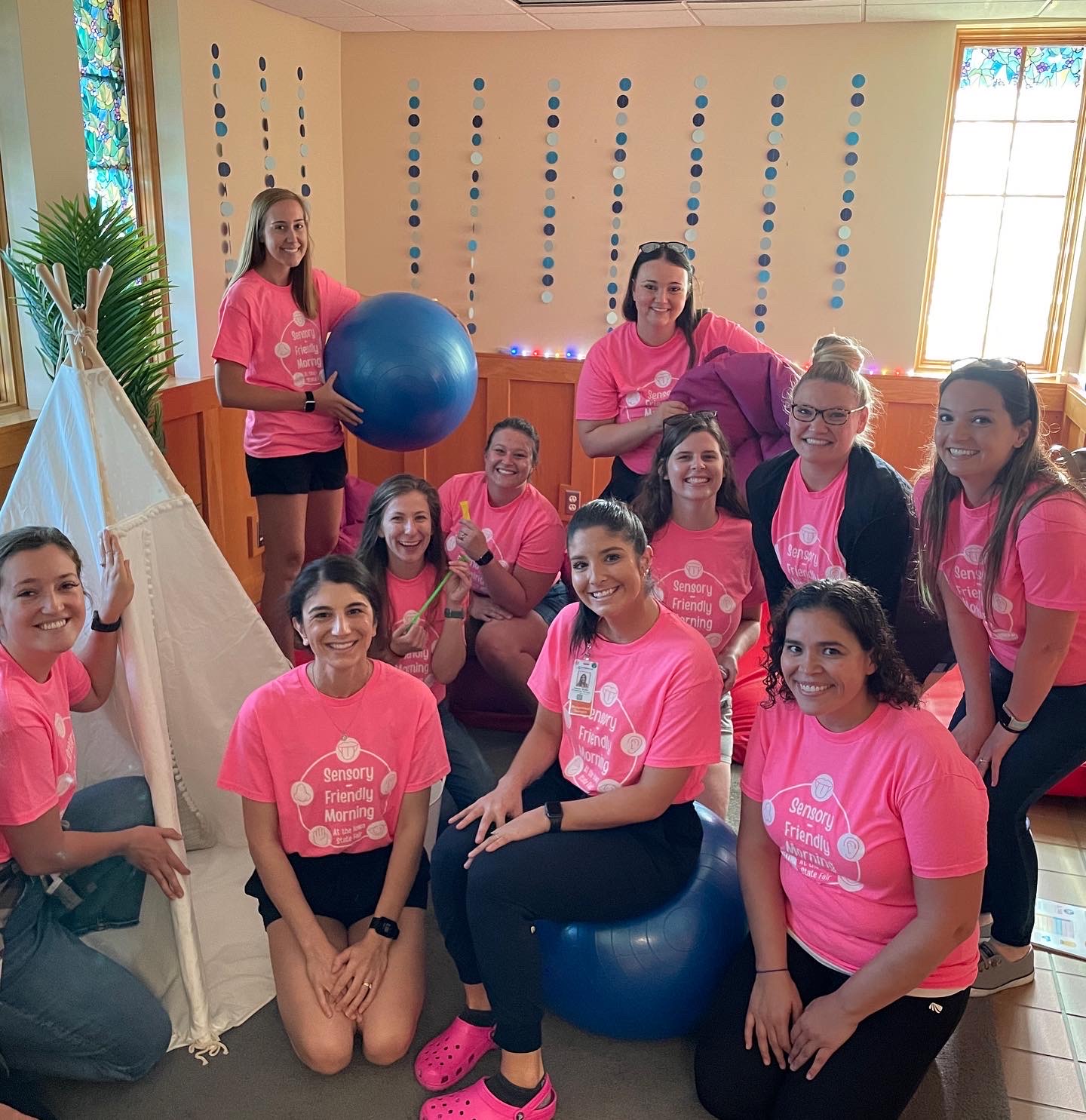How to Make Your Event Sensory-Friendly
Pictured: ChildServe‘s Occupational Therapy Team helped launch the first ever Sensory-Friendly Morning at the Iowa State Fair in 2022.
Looking for tips to make your event welcoming for individuals with autism or sensory processing disorders? Whether you’re a parent, a classroom teacher, or an event coordinator, ChildServe’s team has helpful tips to consider as you look to make your event or space more inclusive.
Sensory-Friendly Tips for a Party at Your Home
- To give individuals a break from the loud sounds of a party, provide a quiet spot (such as a separate room).
- To provide a break from visual stimulation, set up a play tent in the corner, or a separate room with dim lights.
- Children or adults with sensory needs may have differing comfort levels with touch. Always make touch-based activities optional – including things like wearing a party hat/costume. Activities like high-fives, hugs, or a pat on the back can be uncomfortable for some individuals. Be sure to respect their choice to avoid an activity that may be uncomfortable for them, and when possible, provide an alternate way for them to participate.
- Consider providing sensory activities like fidget toys, Play-Doh, or soft blanket. Many families will bring their own preferred toys as needed.
- Include activities in your event that are movement-oriented (tag, pin the tail on the donkey, dancing, swinging, Simon Says etc.).
- Avoid strong smelling lotions, perfumes, candles or air fresheners.
- Be sensitive to those with food aversions, and let them choose what they are comfortable adding to their plate.
- Ask your guests for input, and share the details ahead of time: Let them know you’re excited to have their child in your home, and that you welcome their insight for how to help make the day a success for everyone. Provide details that can help them plan ahead. For example, if you are planning to have live music at a party, share the time frame it is expected to happen so families can plan to be there, or not, depending on their child’s auditory needs.
Sensory-Friendly Tips for the Classroom
- Create a sensory corner that includes a tent or some type of fort (which can decrease light, sound, and other visual distractions).
- Include activities in this tent/fort like fidget toys, books, and a weighted lap pad if needed.
- Incorporate time for movement activities throughout your day and give alternative seating options such a wiggle seat.
- For kids who like to wiggle, strap a Thera-Band around the legs of their chair that they can kick into for pressure.
- Avoid strong smelling lotions, perfumes, or air fresheners.
Sensory-Friendly Event Tips for a Public Event or Conference
- Identify a quieter, dim, separate space where attendees can have a visual/auditory break from the noise, lights and bustle of the event. Adjust lighting in conference rooms to be less bright when possible and appropriate.
- Offer fidgets and earbuds for your guests, or make it clear in your event invite that fidgets/coloring sheets/weighted blankets are welcome at your event.
- Include movement breaks in the schedule and freedom to stretch/get up throughout sessions.
- Avoid scented air fresheners, lotions and perfumes/cologne.
- Ask your guests for input, and share the important details and logistics ahead of time. Families raising a child with special healthcare needs often plan their outings carefully to ensure a safe, successful day for their child. A detailed agenda for the day including location map with parking information, check-in and entrance sites and bathroom accessibility will help families and individuals feel confident coming to your event.
- Provide helpful sensory info ahead of time. For example, if you are planning to have live music/high-energy events, share the time frame it is expected to happen so families can plan to be there, or not, depending on their child’s auditory needs. Let them know that you welcome their insight for how to help make the day a success for everyone.
Do you have a child with sensory concerns? Learn about how ChildServe can help.
About
ChildServe improves the health and well-being of nearly 5,800 children each year through specialized clinical, home, and community-based programs and services. We serve children with developmental delays, disabilities, injuries, and other special healthcare needs.
Follow Us
Contact Us
Johnston | 515-727-8750
Ames | 515-232-7220
Des Moines | 515-280-5332
Iowa City | 319-351-5437
Cedar Rapids | 319-777-7450
Links

